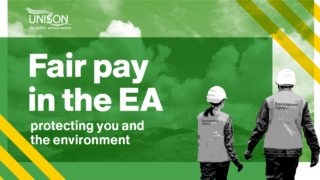Staff at the Environment Agency will today (Friday) begin a third block of strike action in the ongoing dispute over their “woeful” pay rise, says UNISON.
Workers providing crucial services to ensure communities are kept safe, pollution-free and protected will walk out over the space of four days spanning this weekend.
It marks a significant escalation of the industrial action that began late last year to win a wage rise that would enable the Agency workforce to better weather the ongoing financial storm, says UNISON.
Staff have had a terrible deal, which amounts to one of the worst wage rises paid to public sector workers, says UNISON. It follows year after year where pay at the Agency has consistently trailed the cost of living.
The union has written to chancellor Jeremy Hunt this week urging him to intervene in the dispute and free up more money so the Agency can pay its employees fairly.
Otherwise, uncompetitive wages will persuade even more staff to quit, leaving households and businesses at permanent risk because services will no longer be unable to cope in emergencies, says the union.
UNISON is also calling on environment secretary Therese Coffey to hold pay talks with unions and resolve the dispute.
Workers who maintain coastal defences, protect cities, towns and villages from floods, tackle water pollution, deal with hazardous spills and control fly-tipping will strike from 7pm this evening until 7am on Monday (17 April).
Agency workers have already walked out for short periods in January and February and have been working to their contracts, as well as withdrawing from emergency cover rosters for several weeks.
UNISON general secretary Christina McAnea said: “There’s a strong danger that without government intervention the damaging dispute over this woeful wage increase could drag on for months.
“That would cause further discontent among staff and leave at-risk communities without proper protection.
“Uncompetitive pay has forced many of the lowest paid workers at the Agency to quit for higher-waged work elsewhere.
“Others, in specialist technical roles, are also leaving for jobs where they feel their skills will be better recognised and their experience more valued.
“With environmental damage and rising pollution levels in the spotlight like never before, and climate change intensifying the pressure on services, this is no time to leave the Agency understaffed.
“This dispute has gone on for far too long. It’s in everyone’s interests to get round the table, find the extra funding to secure essential services and hammer out a deal.”
Notes to editors:
– Environment Agency staff were given a pay increase of 2% plus £345 last autumn.
– Where there is a threat to life or property from major incidents like flooding, Agency officers will step in as emergency ‘life and limb cover’ during the dispute has been agreed.
– The minimum wage went up to £10.42 an hour on 1 April. Prior to this, the lowest paid workers at the Environment Agency were on £9.53 an hour.
– Environment Agency staff belonging to UNISON have been taking some form of industrial action since late December. As well as action short of a strike, staff have walked out on two previous occasions – 18 January and 7/8 February. Members of Prospect have also been taking action at the Agency.
– UNISON is the UK’s largest union with more than 1.3 million members providing public services in education, local government, the NHS, police service and energy. They are employed in the public, voluntary and private sectors.
Media contacts:
Anthony Barnes M: 07834 865794 E: a.barnes@unison.co.uk
Liz Chinchen M 07778 158175 E: l.chinchen@unison.co.uk


